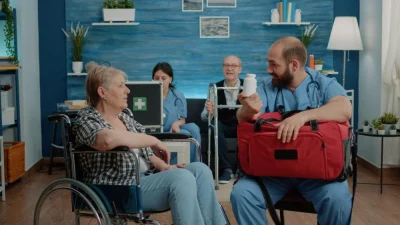Why Did You Send Me To a Specialist?
Warning: Undefined variable $post in /home/dietofli/public_html/wp-content/plugins/code-snippets/php/snippet-ops.php(584) : eval()'d code on line 3
Warning: Attempt to read property "ID" on null in /home/dietofli/public_html/wp-content/plugins/code-snippets/php/snippet-ops.php(584) : eval()'d code on line 3
The estimated reading time is 4 minutes
Warning: Undefined variable $post in /home/dietofli/public_html/wp-content/plugins/oxygen/component-framework/components/classes/code-block.class.php(115) : eval()'d code on line 3
Warning: Attempt to read property "ID" on null in /home/dietofli/public_html/wp-content/plugins/oxygen/component-framework/components/classes/code-block.class.php(115) : eval()'d code on line 3
One in three patients is usually sent to a specialist in primary care. You will know this because the doctor issues a GP Referral where he recommends that you schedule an appointment with a doctor who did additional studies in a certain specialty. (1)
But what is each specialty responsible for? Here we tell you about some specialties:
- Pathological Anatomy: It deals with the study of the causes of the development and the consequences of the diseases by means of morphological techniques.
- Anesthesiology: Anesthesiology is the practice of medicine that involves the care of patients before and after surgery and the treatment of pain.
- Audiology, Otoneurology, and Phoniatrics: Specialty that studies the normality and pathology of hearing, voice, language, learning, and balance.
- Quality of Clinical Care: Specialty that focuses on guaranteeing quality, safety, and self-sustainability of health services, through the management of health resources and infrastructure.
- General Surgery: General surgery covers a wide variety of diseases such as breast cancers, endocrine glands, skin and gastrointestinal tract, trauma care and burns, among others.
- Epidemiology: Specialty that studies the frequency and distribution of diseases and their determinants in a population.
- Medical Genetics: Is the specialist trained in diagnostic and therapeutic procedures for patients with diseases of genetic origin.
- Geriatrics: Geriatricians focus on the prevention, diagnosis, treatment, and rehabilitation of diseases in the elderly.
- Gynecology and Obstetrics: This medical practice provides medical care to women throughout their lives, including childbirth and gynecological surgery.
- Imaging, Diagnostics, and Therapeutics: It deals with generating images of the interior of the body through X-rays, ultrasounds, magnetic fields, and other physical agents for the diagnosis of diseases.
- Medicine of Physical and Sports Activity: It treats the effects of the exercise of sport and physical activity in the human organism, from the prevention and treatment of diseases and injuries.
- Family Medicine: A family physician is trained to provide care to patients and their families with a focus on their community.
- Internal Medicine: An internist provides comprehensive long-term care in diseases such as cancer, infections, and diseases that affect the heart, blood, kidneys, joints, and the digestive, respiratory, and vascular systems.
- Legal Medicine: A legal doctor is the holder of practical, theoretical and formative knowledge for the optimal management of legal medical situations that may arise and is responsible for giving them follow-up.
- Nuclear Medicine and Molecular Imaging: Nuclear Medicine is a medical specialty that is dedicated to perform diagnostic studies and treat diseases in a safe and effective way using small amounts of radioactive material.
- Preventive Medicine: It focuses on the health of individuals and populations defined in order to protect, promote and maintain their health to prevent disease, disability, and premature death.
- Rehabilitation Medicine: It is the medical specialty related to the diagnosis, evaluation, and treatment of patients with physical disabilities.
- Occupational and Environmental Medicine: Medical specialty dedicated to diseases and accidents that occur due to the cause or consequence of work activity.
- Emergency Medicine: Emergencyphysicians focus on rapid diagnosis, initial resuscitation and treatment of patients' diseases.
- Pneumology: Treats diseases of the respiratory system and focuses on the diagnosis, treatment, and prevention of diseases of the lung, pleura, and mediastinum.
- Ophthalmology: Ophthalmologists are medically trained to diagnose, monitor, and treat medically or surgically all eye and visual disorders.
- Otolaryngology and Head and Neck Surgery: Otolaryngologists address diseases and disorders of the ear, nose, throat and related structures of the head and neck.
- Clinical pathology: Clinical pathologists are experts in the biochemical, physiological and histological changes that indicate the nature of the disease.
- Pediatrics: Pediatricians focus on caring for children from birth to 21 years of age.
- Psychiatry: A psychiatrist specializes in the prevention, diagnosis, and treatment of mental, addictive and emotional disorders.
- Radio Oncology: Oncologists focus on the diagnosis and treatment of cancer.
- Traumatology and Orthopedics: It is the medical specialty that is dedicated to the study of injuries of the locomotor system. (2)
Sophia Smith
She is a renowned nutritionist and freelance writer whose topics of interest include healthy living and healthy eating. She is passionate about introducing new and delicious healthy meals while balancing her time between cooking and going to the gym. Her mission is to change the life of as many people as she can and make them the best version of themselves.














